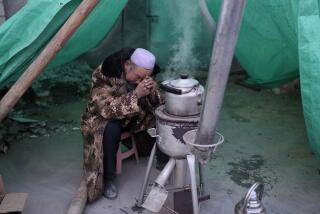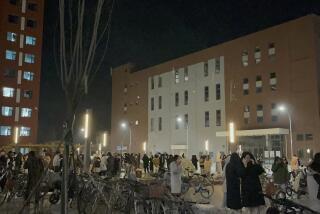Tribute to China’s quake victims
- Share via
BEICHUAN, CHINA — Deng Meirong’s knees grew weak as she walked up the scenic path high above her hometown. Fallen boulders were everywhere. The air smelled of disinfectant. Then, hundreds of feet below, the remains of Beichuan came into view.
Deng, 22, looked for the middle school she had attended but could see only a slope of dirt and rocks. The river was plugged by a landslide. She pointed down at the old section of the town, where her best friend had lived.
“She was probably resting at home that day,” said Deng, who had left three years ago for college in the city of Chengdu, 80 miles south. Deng said she had been watching television reports about the quake and her town but had been too scared to come, until Sunday. “I want to cry, but I have no tears left.”
Of all the towns in China’s Sichuan province hit by the May 12 quake, none took it as hard as Beichuan. Although estimates of the death toll vary, the county governor has said that only 4,000 of the town’s 22,000 permanent residents escaped that day. About 60% of the buildings in the newer area of town were flattened, as were 80% in the old section.
The destruction was such that the government is planning to rebuild the town elsewhere. The ruins of Beichuan are expected to be preserved as a quake museum and memorial.
It would be a fitting tribute to those who died and a reminder for the living, said Tan Jihe, a cultural expert at the Sichuan Provincial Academy of Social Sciences.
“We should maintain it as a relic so that friends and relatives will have a place to mourn and others will not forget what happened,” he said.
Tan was speaking for himself as much as anybody. He lost a close friend and fellow scholar, Xie Xingpeng, who was working in Beichuan -- researching the culture of the region’s Qiang minority, as he had for 20 years.
“We had a phone call from him on the 12th at 11:30 a.m., and then he went to the library to borrow some books,” Tan said. “We never heard from him after that. Nor did we find his name among the dead or missing.
“I was told that the library was completely buried under the ground,” Tan said, “so probably even his body will never be found.”
In fact, crews have given up looking for bodies here. Bulldozers have cleared some of the rubble. Guards blocked people from going into town. From the scenic pass on a Sunday afternoon, there was no sign of life below, except for a pack of dogs running wildly.
Beichuan was built here only in 1951, moved from another location in the mountains because of bad geographic conditions. The town’s earthquake risk has long been known; the valley sits on the Dragon’s Gate seismic fault.
It was Chinese Premier Wen Jiabao, in a visit here shortly after the quake, who suggested that Beichuan be preserved as a memorial. Ever since, people have been debating the idea.
Some have questioned whether such a memorial would be too cruel, prolonging the pain for survivors and those who never knew what happened to those lost under the rubble. But others have argued that an earthquake museum, the first of its kind for China, would teach people about the dangers of natural disasters, the nation’s resilient spirit and the courage of those who risked their lives to save others in the quake, which has claimed more than 65,000 lives.
Other hard-hit areas also are likely to establish memorials. In Dujiangyan, a resort town near Chengdu, officials are considering a number of buildings that could be preserved as museum sites, including the remains of Juyuan Middle School, where hundreds of children were buried.
On the outskirts of Beichuan, Yang Defang, 45, sat forlornly on a chair Sunday. Behind her was a pile of rubble that was once her two-story home. On the street in front of her, men dressed in yellow moon suits walked by, spraying insecticide.
Before the quake, Yang had gone into Beichuan every day to buy groceries and sell her homegrown vegetables. She says she lost 40 friends on May 12, along with her younger brother and his wife.
Regardless of whether the town is turned into a memorial site, it will always be one for Yang. She remains haunted by its remains and the questions that they prompt.
“You don’t know where they were that moment,” she said. “Were they in the office or on the street? You only know that they didn’t come back.”
--
Cao Jun of The Times’ Shanghai Bureau contributed to this report.
More to Read
Sign up for Essential California
The most important California stories and recommendations in your inbox every morning.
You may occasionally receive promotional content from the Los Angeles Times.











